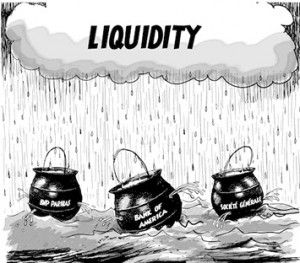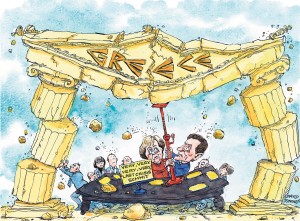Markets will generally continue to grapple with an environment of capital superabundance. Even with moderating financial growth in developed markets, the fundamental forces that inflated the global balance sheet since the 1980s—financial innovation, high-speed computing and reliance on leverage—are still in place.
There certainly has been a great deal of liquidity in the two years. This is likely to continue over the next several years, and maybe well into the next decade. Policies that implicitly or explicitly constrained growth in median household income relative to GDP are more to blame than the changes in the financial system because these plosives tended to force up the savings rate. The financial system changes are much more likely to be consequences rather than causes of abundant liquidity, although there is plenty of historical evidence to suggest that the two come together, and that they are mutually reinforcing.
Technology “revolutions” tend to take place when a huge amount of risk-seeking capital flows into very risky and often capital-intensive high-tech investments, generating large network benefits and creating tremendous rewards for successful technology ventures. Particularly for those technology projects that benefit from growing networks — railroads, telephones, video, the internet — there is a strong element of pro-cyclicality, in that early successes spur greater visibility and faster adoption, which of course creates further success.
What today we call economic globalization — a combination of rapid technological progress, large-scale capital flows, and burgeoning international trade — has happened many times before in the last 200 years. During each of these periods (including our own), engineers and entrepreneurs became folk heroes and made vast fortunes while transforming the world around them. They exploited scientific advances, applied a succession of innovations to older discoveries, and spread the commercial application of these technologies throughout the developed world. Communications and transportation were usually among the most affected areas, with each technological surge causing the globe to “shrink” further. As a historical rule it was primarily commerce and finance that drove globalization, not science or technology, and certainly not politics or culture.
Are we in such a period? We certainly were before the 2007-08 crisis, but every globalization period has been followed by a contraction which, too, has certain characteristics in common.
This disruption has already occurred to some extent. After 2007-08, global GDP growth dropped sharply, the growth in global trade dropped even more sharply, we have seen soaring unemployment, and I expect that we will soon see a wave of sovereign defaults.
But this time may be different in one important way. The 2007-08 crisis may well be the first global crisis that has occurred in a period of credible fiat currency. The Liquidity Issue









